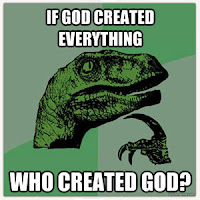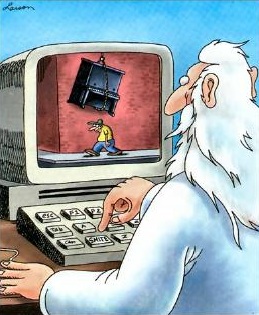Lately two three-letter words have been getting me thinking about the problem of evil. They are simple words that may stand alone in order to ask two unique questions. It seems that when we properly distinguish between these two words, we can see a clear pointer to the truth of Christianity playing out in the lives of every person alive. These two words are "How" and "Why".
How vs. Why and Its Common Confusion
"How" is a question of mechanism. When someone asks this question, they are (presumably) looking for the physical, cause-and-effect series that led to the result. If someone asks how a house is built, the answer would include all the steps from laying the foundation to the final inspection.How vs. Why and Its Common Confusion
"Why" is a question of purpose. When someone asks this question, they are (presumably) looking for the reason that the house was built. If someones asks why a house is built, the answer would normally include the fact that it will provide a living space for a family.
I've noticed that quite often, these two very different questions are confused by both questioner and listener. A lot of times when someone wants to know "how" something took place, they will ask "why" it happened. Likewise, if someone wants to know "why" something happened, they will ask "how" it took place. In some cases the listener will understand the question (regardless of the incorrect word being used) and provide the answer appropriate to the question, but there are other times that the listener does not recognize that someone is asking "why" and they answer "how" instead (because they asked "how").
Confusion of the questions can have trivial effects or eternal consequences. Since "why" is a question of purpose, in worldviews where ultimate purpose does not exist, a "why" question is irrational to ask about suffering, evil, and even existence. A person who asks "why" assumes that there is a purpose, and they want to know it. But if a worldview that posits no ultimate purpose is true, then the assumptions in the question contradict reality- that is how a "why" question is irrational on, say, atheism, but is perfectly valid (and compelled) if Christianity is true.
Worldview Implications
In atheism, asking why anything happens cannot be answered because "why" is a question of ultimate purpose, but atheism, a priori, has no ultimate purpose. Now, it can answer "how" something happened. A person could go into all the different laws of physics and chain reactions of cause-and-effect that led to the result that the question is being asked about.
Unlike atheism, theism can answer both questions. Theism can answer "how" something took place and "why" it took place. Atheism uses the scientific disciplines to answer a lot of "how" questions (not all, though that is a topic for another post)- that is the limit of science's ability. If we believe that science will answer all our questions, we are wrong. Science cannot answer our "why" questions. Granted science may be able to answer "how" we can ask "why" questions, but it will never answer "why" we ask "why" questions. It may be able to answer "how" we have a sense of purpose, but it will never answer "why" we have a sense of purpose (more on this below). An attempt to answer "how" when the question is "why" is an attempt to explain away what cannot be explained by naturalistic worldviews.
In atheism, asking why anything happens cannot be answered because "why" is a question of ultimate purpose, but atheism, a priori, has no ultimate purpose. Now, it can answer "how" something happened. A person could go into all the different laws of physics and chain reactions of cause-and-effect that led to the result that the question is being asked about.
Unlike atheism, theism can answer both questions. Theism can answer "how" something took place and "why" it took place. Atheism uses the scientific disciplines to answer a lot of "how" questions (not all, though that is a topic for another post)- that is the limit of science's ability. If we believe that science will answer all our questions, we are wrong. Science cannot answer our "why" questions. Granted science may be able to answer "how" we can ask "why" questions, but it will never answer "why" we ask "why" questions. It may be able to answer "how" we have a sense of purpose, but it will never answer "why" we have a sense of purpose (more on this below). An attempt to answer "how" when the question is "why" is an attempt to explain away what cannot be explained by naturalistic worldviews.
Applying to The Problem of Evil
For a person who assumes that there is a purpose behind a certain happening (something evil tends to the what the question is about), answering "how" is not sufficient. In fact, it is actually a red herring, intentional or not. The person is looking for comfort in the form of assurance that the suffering was not gratuitous and was not useless. Answering "how" when someone is asking "why" can actually make the situation worse for the person- by implying that the answerer either doesn't understand the pain the person is experiencing as they ask the question or that they have no comfort to offer but are trying to hide that fact by avoiding the actual question.
When we apply this distinction between the two types of questions to the problem of evil, we realize that the logical problem of evil is a "how" question. It asks how an all-loving and all-powerful God and evil can co-exist. It has been recognized generally that this question has been answered. But, that does not mean that the emotional problem of evil is answered. They are two very different questions.
The emotional problem of evil is a "why" question. It questions the ultimate purpose of evil and suffering in the world. Now, let's assume for the moment that when someone asks this question that they are assuming that the evil or suffering they are asking about does have a purpose (meaning that they assume theism). The ultimate purpose behind the evil and suffering in the world is difficult to answer, at best, because of the fact that man does not have the mind of God- man does not necessarily know the purposes behind certain things that happen. But we don't have to always appeal to mystery to answer the emotional problem of evil about certain events.
Many of us recognize that events that take place in our lives would not have happened if it were not for other events in our past. Notice that I am looking to the cause-and-effect series. I am asking a "how" question of a recent event to answer the "why" question of an event further in the past. If we can see the good that is taking place now (the event that sparks the "how" question), then we can see the purpose for the suffering that we had to endure in the past (the events that spark the "why" question).
The Scope of Evil Events
Now we have to remember that the emotional problem of evil will never be completely answered. We will not be able to see every good thing that comes from every evil event that takes place. What takes place in our lives does not only affect us; it affects those around us, and what happens to them affects those around them, and so on. The implication here is that we may never know the reason that we had to endure some suffering. We also may never know the reason that someone else had to endure suffering. And interestingly enough, the suffering that we see in the past can be part of the cause-and-effect series that has led to what good we have in our own lives today.
Patience is a Virtue
Notice that in order to answer the "why" question of the emotional problem of evil, we must be patient, and we must be actively looking for the paths that led to what is good in our lives today. It is very rare that we will know the purpose behind an evil event right away. Very few of us like to wait.
We are very impatient; we want everything, and we want it now. We want to know everything, and we want to know it all now. But as you can see, life bears out this truth: "Those who wait on the Lord, will renew their strength" (Isaiah 40:31a NASB). When we are patient to see what God brings about in our lives or in the lives of others, the emotional weakness that we suffered from a specific event in the past can be lifted when we see that it was part of God's mechanism for bringing about something good in our lives or someone else's life. By that new recognized connection our strength is renewed, and our trust in God is increased for the next time that something evil takes place in our lives (see my posts "What is Faith?" and "Is Faith Emotional or Logical?").
The Purpose Of The Emotional Problem of Evil
Many people see the emotional problem of evil as a huge challenge to the truth of Christianity. It is, if you wish to interpret it that way. One can certainly think that since they don't or can't know everything (see "Dangers of Requiring Complete Knowledge") that God is evil and unfair to you. However, I believe we must ask another "why" question: "Why must we struggle with the emotional problem of evil?" Notice that I didn't ask "how do we..." (I'll let the naturalists attempt to answer that one). The key to answer this question is above- building trust in God. If people did not, first experience evil and suffering, and second, feel the emotional pain from it, we would not struggle with it ("how" the struggle exists). And without the struggle, we would not recognize our own weakness and powerlessness in our lives to avoid evil and suffering. The suffering in life painfully reminds us that we are not in control until the day we die. Without that recognition, we would not be able to recognize our need for Someone who loves us enough to die so that we can eternally escape evil and suffering. The purpose for the existence of the emotional problem of evil is to bring people to Christ and know Him more intimately (see the recent post "Tornadoes, Flat Tires, and Moore").
Conclusion
Atheism does not have the ability to answer our most painful and real question: "why". If we want such answers, we have to recognize that life is not about us, and at best, we are second to One. And with that humble recognition comes a promise: God's love never fails. Only through Christ can we answer "how" and "why" evil exists and why we must suffer the pain of evil.
The emotional problem of evil is a "why" question. It questions the ultimate purpose of evil and suffering in the world. Now, let's assume for the moment that when someone asks this question that they are assuming that the evil or suffering they are asking about does have a purpose (meaning that they assume theism). The ultimate purpose behind the evil and suffering in the world is difficult to answer, at best, because of the fact that man does not have the mind of God- man does not necessarily know the purposes behind certain things that happen. But we don't have to always appeal to mystery to answer the emotional problem of evil about certain events.
Many of us recognize that events that take place in our lives would not have happened if it were not for other events in our past. Notice that I am looking to the cause-and-effect series. I am asking a "how" question of a recent event to answer the "why" question of an event further in the past. If we can see the good that is taking place now (the event that sparks the "how" question), then we can see the purpose for the suffering that we had to endure in the past (the events that spark the "why" question).
The Scope of Evil Events
Now we have to remember that the emotional problem of evil will never be completely answered. We will not be able to see every good thing that comes from every evil event that takes place. What takes place in our lives does not only affect us; it affects those around us, and what happens to them affects those around them, and so on. The implication here is that we may never know the reason that we had to endure some suffering. We also may never know the reason that someone else had to endure suffering. And interestingly enough, the suffering that we see in the past can be part of the cause-and-effect series that has led to what good we have in our own lives today.
Patience is a Virtue
Notice that in order to answer the "why" question of the emotional problem of evil, we must be patient, and we must be actively looking for the paths that led to what is good in our lives today. It is very rare that we will know the purpose behind an evil event right away. Very few of us like to wait.
We are very impatient; we want everything, and we want it now. We want to know everything, and we want to know it all now. But as you can see, life bears out this truth: "Those who wait on the Lord, will renew their strength" (Isaiah 40:31a NASB). When we are patient to see what God brings about in our lives or in the lives of others, the emotional weakness that we suffered from a specific event in the past can be lifted when we see that it was part of God's mechanism for bringing about something good in our lives or someone else's life. By that new recognized connection our strength is renewed, and our trust in God is increased for the next time that something evil takes place in our lives (see my posts "What is Faith?" and "Is Faith Emotional or Logical?").
The Purpose Of The Emotional Problem of Evil
Many people see the emotional problem of evil as a huge challenge to the truth of Christianity. It is, if you wish to interpret it that way. One can certainly think that since they don't or can't know everything (see "Dangers of Requiring Complete Knowledge") that God is evil and unfair to you. However, I believe we must ask another "why" question: "Why must we struggle with the emotional problem of evil?" Notice that I didn't ask "how do we..." (I'll let the naturalists attempt to answer that one). The key to answer this question is above- building trust in God. If people did not, first experience evil and suffering, and second, feel the emotional pain from it, we would not struggle with it ("how" the struggle exists). And without the struggle, we would not recognize our own weakness and powerlessness in our lives to avoid evil and suffering. The suffering in life painfully reminds us that we are not in control until the day we die. Without that recognition, we would not be able to recognize our need for Someone who loves us enough to die so that we can eternally escape evil and suffering. The purpose for the existence of the emotional problem of evil is to bring people to Christ and know Him more intimately (see the recent post "Tornadoes, Flat Tires, and Moore").
Conclusion
Atheism does not have the ability to answer our most painful and real question: "why". If we want such answers, we have to recognize that life is not about us, and at best, we are second to One. And with that humble recognition comes a promise: God's love never fails. Only through Christ can we answer "how" and "why" evil exists and why we must suffer the pain of evil.



































